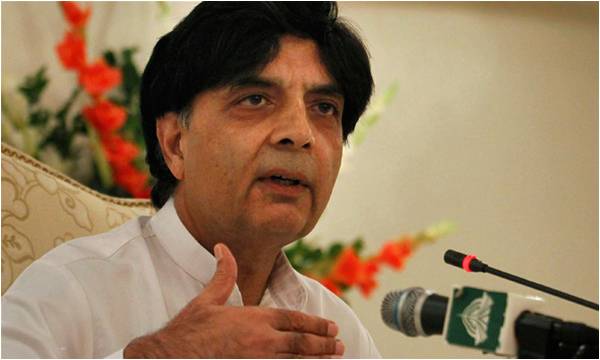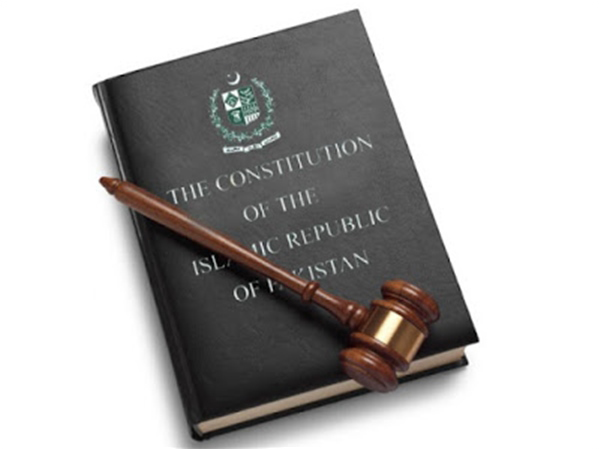
While Interior Minister Chaudhry Nisar Ali Khan’s statement on Monday on taking “action against those calling others kafir (non-Muslim)” has been lauded on multiple fronts, the state’s duplicity on takfir (excommunicating a person or sect) was simultaneously called out. It is ironic that the government’s arguably refreshing stance against mudslinging accusations of apostasy was highlighted on the 41st anniversary of the Second Amendment to the Pakistani Constitution, which ‘officially’ excommunicated the Ahmadiyya sect under the auspices of Pakistan’s ‘first democratically elected leader’ Zulfikar Ali Bhutto.
In his press conference on September 7, while discussing potential madrassa reform, Nisar claimed that the government had ‘already tackled hate speech and [the] glorification of terrorists in the first phase’ of the National Action Plan (NAP). The Punjab Minister for Law and Parliamentary Affairs Rana Sanaullah declared a couple of weeks ago that, “not a single madrassa in (Punjab) was reported to have any links with militancy.” So where is hate speech being ‘tackled’ if the hubs are being given the state’s green signal?
If the federal ministers believe that none of the “13,787 geo-tagged seminaries” in Punjab deem the Shia to be infidels and, in turn, wajib-ul-qatl (worthy of being murdered), the state is clearly not serious about tackling internal militancy. To claim that none of these madrassas calls for the murder of Ahmadis is tantamount to burying one’s head in the sand, leaving one’s neck exposed to the mercy of the machete. To link the spread of wajib-ul-qatl edicts to the ensuing militancy really is a simple equation. And yet our federal ministers fail to find the most obvious of links.
To give the madrassas a clean bill of health means that the government is not interested in tackling takfir, which is something embedded in our social setup. According to a Pew Survey in 2012, when Shia killings in Pakistan had peaked, only 50% of the surveyed Pakistanis accepted the Shia as Muslims – 7% for Ahmadis.

With soaring levels of bigotry and xenophobia, the state’s ostensible action against religious extremism, which doesn’t even address – let alone counter – its ideological origins, will continue to boomerang on Pakistan after every span of militarily enforced ‘peace’. Furthermore, as long as the Constitution of Pakistan itself continues to play God and give verdicts on who can and can’t call oneself a Muslim, any government claims of going after takfir or hate speech remain laughable.
The Second Amendment to Pakistan’s Constitution and Ordinance XX of the Penal Code, which bars Ahmadis from “posing as Muslims” and using Islamic titles or salutations, are a direct breach of, among other codes, the UN’s Human Rights Charter, the International Covenant on Civil and Political Rights (ICCPR) and Pakistan’s own Constitution. Not only does the Pakistani Constitution vow to protect every citizen’s “right to life and liberty” – with the right to self-identify being a fundamental part – it sanctions the “freedom to profess religion” and “freedom of religious institution”.
What’s ironic in Pakistan’s jurisprudential bigotry is this: not only does the Constitution violate its own guarantee to protect Ahmadis’ freedom to self-identify and profess religion by sanctioning their non-Muslim status, it also does not allow their ideology the rights that other religions have. And so, while the Ordinance XX forces Ahmadis to call their mosques ‘places of worship’, Ahmadi religious institutions and figures aren’t protected, let alone deemed worthy of esteem, even as representatives of a separate religion.
When the Penal Code criminalises a community’s reading of the Quran and Islamic scriptures – the very text that’s supposed to encourage ‘non-believers’ to convert to Islam – it’s obvious that the state isn’t even ready to consider Ahmadis ‘deviants’ who might be encouraged to return to the ‘true path’; it is merely bent on marginalising the community through every possible means. This is further clarified by the state needing every ‘Muslim’ citizen’s signature on a document declaring Ahmadis non-Muslims in order to get ID cards or passports. For a state clamouring that it has ‘already tackled hate speech’ through the NAP, that declaration forcibly endorsed by hordes on a daily basis at NADRA and passport offices, is the most repulsive exhibition of official, government-sanctioned hate speech.
And so, with the state play-acting a no-nonsense approach towards takfir and hate speech, will it first address its own exhibits of bigotry? Will it take “strict action” against itself for forcing on the entire nation the official, bigoted view of a community? Will the much-lauded NAP include Pakistan’s own Constitution as a document that authorises xenophobia, resulting in incidents like the Shab-e-Qadr mob violence in 1995 and the May 2010 massacre in Lahore, among countless others?
When the country’s topmost politician Nawaz Sharif has to retract his statement calling Ahmadis ‘brothers’ in the aftermath of the 2010 attacks, when renowned TV anchor Aamir Liaquat Hussain hosts multiple shows inciting violence against the community, and when top government officials and public figures participate in hate campaigns and conferences that target the community, the state’s complicity in anti-Ahmaddiya hate crime is evident. The police desecrating Ahmadi graves and parliamentarians like Ilyas Chinioti calling for “war to be waged against Ahmadis” reflect the perfectly legal status of Ahmaddiya persecution.
Clamours to apostatise the Shia community, propagated by the likes of Lashkar-e-Jhangvi (LeJ) and Sipah Sahaba Pakistan (SSP), now known as Ahle Sunnat Wal Jamaat (ASWJ) – all with hubs in Punjab – have their roots in Pakistani ‘democrats’ succumbing to calls for Ahmaddiya excommunication in 1974. The same calls are being made for everyone who does not adhere to a bigoted and narrow version of Islam. And so, it shouldn’t be particularly difficult to understand that undoing this chain of takfir is only possible if the state undoes its own Constitutional takfir – one that has exacerbated calls for blasphemy and murder over the past 41 years.
In his press conference on September 7, while discussing potential madrassa reform, Nisar claimed that the government had ‘already tackled hate speech and [the] glorification of terrorists in the first phase’ of the National Action Plan (NAP). The Punjab Minister for Law and Parliamentary Affairs Rana Sanaullah declared a couple of weeks ago that, “not a single madrassa in (Punjab) was reported to have any links with militancy.” So where is hate speech being ‘tackled’ if the hubs are being given the state’s green signal?
With the state play-acting a no-nonsense approach towards hate speech, will it first address its own bigotry?
If the federal ministers believe that none of the “13,787 geo-tagged seminaries” in Punjab deem the Shia to be infidels and, in turn, wajib-ul-qatl (worthy of being murdered), the state is clearly not serious about tackling internal militancy. To claim that none of these madrassas calls for the murder of Ahmadis is tantamount to burying one’s head in the sand, leaving one’s neck exposed to the mercy of the machete. To link the spread of wajib-ul-qatl edicts to the ensuing militancy really is a simple equation. And yet our federal ministers fail to find the most obvious of links.
To give the madrassas a clean bill of health means that the government is not interested in tackling takfir, which is something embedded in our social setup. According to a Pew Survey in 2012, when Shia killings in Pakistan had peaked, only 50% of the surveyed Pakistanis accepted the Shia as Muslims – 7% for Ahmadis.

With soaring levels of bigotry and xenophobia, the state’s ostensible action against religious extremism, which doesn’t even address – let alone counter – its ideological origins, will continue to boomerang on Pakistan after every span of militarily enforced ‘peace’. Furthermore, as long as the Constitution of Pakistan itself continues to play God and give verdicts on who can and can’t call oneself a Muslim, any government claims of going after takfir or hate speech remain laughable.
The Second Amendment to Pakistan’s Constitution and Ordinance XX of the Penal Code, which bars Ahmadis from “posing as Muslims” and using Islamic titles or salutations, are a direct breach of, among other codes, the UN’s Human Rights Charter, the International Covenant on Civil and Political Rights (ICCPR) and Pakistan’s own Constitution. Not only does the Pakistani Constitution vow to protect every citizen’s “right to life and liberty” – with the right to self-identify being a fundamental part – it sanctions the “freedom to profess religion” and “freedom of religious institution”.
What’s ironic in Pakistan’s jurisprudential bigotry is this: not only does the Constitution violate its own guarantee to protect Ahmadis’ freedom to self-identify and profess religion by sanctioning their non-Muslim status, it also does not allow their ideology the rights that other religions have. And so, while the Ordinance XX forces Ahmadis to call their mosques ‘places of worship’, Ahmadi religious institutions and figures aren’t protected, let alone deemed worthy of esteem, even as representatives of a separate religion.
When the Penal Code criminalises a community’s reading of the Quran and Islamic scriptures – the very text that’s supposed to encourage ‘non-believers’ to convert to Islam – it’s obvious that the state isn’t even ready to consider Ahmadis ‘deviants’ who might be encouraged to return to the ‘true path’; it is merely bent on marginalising the community through every possible means. This is further clarified by the state needing every ‘Muslim’ citizen’s signature on a document declaring Ahmadis non-Muslims in order to get ID cards or passports. For a state clamouring that it has ‘already tackled hate speech’ through the NAP, that declaration forcibly endorsed by hordes on a daily basis at NADRA and passport offices, is the most repulsive exhibition of official, government-sanctioned hate speech.
And so, with the state play-acting a no-nonsense approach towards takfir and hate speech, will it first address its own exhibits of bigotry? Will it take “strict action” against itself for forcing on the entire nation the official, bigoted view of a community? Will the much-lauded NAP include Pakistan’s own Constitution as a document that authorises xenophobia, resulting in incidents like the Shab-e-Qadr mob violence in 1995 and the May 2010 massacre in Lahore, among countless others?
When the country’s topmost politician Nawaz Sharif has to retract his statement calling Ahmadis ‘brothers’ in the aftermath of the 2010 attacks, when renowned TV anchor Aamir Liaquat Hussain hosts multiple shows inciting violence against the community, and when top government officials and public figures participate in hate campaigns and conferences that target the community, the state’s complicity in anti-Ahmaddiya hate crime is evident. The police desecrating Ahmadi graves and parliamentarians like Ilyas Chinioti calling for “war to be waged against Ahmadis” reflect the perfectly legal status of Ahmaddiya persecution.
Clamours to apostatise the Shia community, propagated by the likes of Lashkar-e-Jhangvi (LeJ) and Sipah Sahaba Pakistan (SSP), now known as Ahle Sunnat Wal Jamaat (ASWJ) – all with hubs in Punjab – have their roots in Pakistani ‘democrats’ succumbing to calls for Ahmaddiya excommunication in 1974. The same calls are being made for everyone who does not adhere to a bigoted and narrow version of Islam. And so, it shouldn’t be particularly difficult to understand that undoing this chain of takfir is only possible if the state undoes its own Constitutional takfir – one that has exacerbated calls for blasphemy and murder over the past 41 years.

